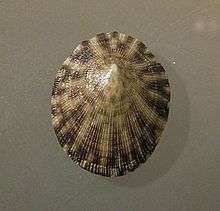Nipponacmea
Nipponacmea is a genus of sea snails, the true limpets, marine gastropod mollusks in the family Lottiidae.[2]
| Nipponacmea | |
|---|---|
 | |
| Nipponacmea fuscoviridis | |
| Scientific classification | |
| Kingdom: | |
| Phylum: | |
| Class: | |
| (unranked): | clade Patellogastropoda |
| Superfamily: | |
| Family: | |
| Genus: | Nipponacmea Sasaki & Okutani, 1993[1] |
| Type species | |
| Patella schrenkii Lischke, 1868 | |
Distribution and habitat
These species are very common among the Japanese gastropod fauna on rocks and boulders in the intertidal zone of Japanese waters and adjacent islands.
Description
The shape of the thin shell is limpet-like or patelliform. It has a medium size and has a low to medium height. The base (the aperture) has an oval shape and is longer than wide.
The color of the shell is greenish brown and characteristically bedecked with granules of fine radial riblets. . The interior is greenish blue and has a shining luster. The thin and broad interior shell margin exhibits a distinct color and texture from the adjoining area.
The shell is constituted of five layers of different structure, while the genus Notoacmea has six layers.
The gill is flaplike with a bipectinate ctenidium situated in the nuchal cavity and lacks secondary pallial gills. The radula has typically three pairs of lateral teeth and one pair of marginal teeth that is either lacks any function or is degenerated with growth or is lacking from the beginning.
Species
Until 1993 the species of these Japanese limpets were allocated in the genus Notoacmea.[1] They were reassigned based on different anatomical characters and shell structure and their endemism to the Japonic zoogeographical province (Japanese waters and adjacent island chains). There wasn't just enough similarity with the New Zealand species from Notoacmea. Also the radula characters were different. Lindberg (in 1986) had pointed out that the genus Notoacmea was restricted to species from New Zealand and Australia and that the North American species belonged in Tectura. The eight Japanese species had been unsettled until this study. Some authors consider them color variations, others regard them as subspecies or as independent species.[1]
Species within the genus Nipponacmea include:
- Nipponacmea concinna (Lischke, 1870)[3]
- Nipponacmea fuscoviridis (Teramachi, 1949)[4]
- Nipponacmea gloriosa (Habe, 1944)[5]
- Nipponacmea habei (Saski & Okutani, 1994)[6]
- Nipponacmea moskalevi Chernyshev & Chernova, 2002[7]
- Nipponacmea nigrans (Kira, 1961)[8]
- Nipponacmea radula (Kira, 1961)[9]
- Nipponacmea schrenckii (Lischke, 1868)[10]
- Nipponacmea teramachii (Kira, 1961)[11]
- Nipponacmea vietnamensis Chernyshev, 2008[12]
References
- Sasaki, T.; Okutani T. (1993). "New genus Nipponacmea (Gastropoda, Lottiidae): a revision of Japanese limpets hitherto allocated in Notoacmea" (PDF). Venus, Jap. Journ. Malac. 52 (1): 1–40. Archived from the original (PDF) on 2011-07-16. Retrieved 2010-07-26.
- Nipponacmea . Retrieved through: World Register of Marine Species on 13 April 2010.
- Nipponacmea concinna (Lischke, 1870). Retrieved through: World Register of Marine Species on 13 April 2010.
- Nipponacmea fuscoviridis (Teramachi, 1949). Retrieved through: World Register of Marine Species on 13 April 2010.
- Nipponacmea gloriosa (Habe, 1944). Retrieved through: World Register of Marine Species on 13 April 2010.
- Nipponacmea habei (Saski & Okutani, 1994). Retrieved through: World Register of Marine Species on 13 April 2010.
- Nipponacmea moskalevi Chernyshev & Chernova, 2002. Retrieved through: World Register of Marine Species on 13 April 2010.
- Nipponacmea nigrans (Kira, 1961). Retrieved through: World Register of Marine Species on 13 April 2010.
- Nipponacmea radula (Kira, 1961). Retrieved through: World Register of Marine Species on 13 April 2010.
- Nipponacmea schrenckii (Lischke, 1868). Retrieved through: World Register of Marine Species on 13 April 2010.
- Nipponacmea teramachii (Kira, 1961). Retrieved through: World Register of Marine Species on 13 April 2010.
- Nipponacmea vietnamensis Chernyshev, 2008. Retrieved through: World Register of Marine Species on 13 April 2010.